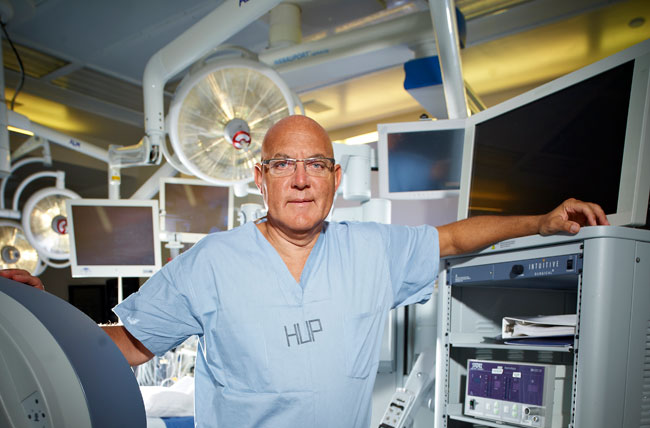
Penn Medicine has one of the most comprehensive and respected bariatric (weight loss) surgery programs in the U.S. We offer the full range of weight loss surgery procedures, including vertical sleeve gastrectomy, Roux-en-Y gastric bypass surgery and adjustable gastric band.
We are a leader in minimally-invasive robotic techniques, which offer the potential for fewer complications, less pain, a quicker return home and a lower risk of needing a follow-up surgery. Our surgeons are also experts in revisional surgery and regularly work with patients who had a previous surgical weight loss procedure and experienced complications or did not achieve your weight loss goals.
The American Society for Bariatric Surgery has designated the bariatric surgery program at the Hospital of the University of Pennsylvania a "Center of Excellence." This designation recognizes programs with a demonstrated record of favorable outcomes. To earn the Center of Excellence designation, a hospital must perform a high number of bariatric surgeries per year, as well as report long-term patient outcomes, have an on-site inspection to verify all data, and maintain a dedicated, multidisciplinary bariatric team.
The Bariatric Surgery Programs at the Hospital of the University of Pennsylvania, Penn Presbyterian Medical Center and Pennsylvania Hospital have all been designated as MBSAQIP Accredited Center- Comprehensive, which means we meet all the standards of rigorous regulations set by MBSAQIP. Our program offers complete support for morbidly obese people both before and lifelong after weight loss surgery.
Bariatric Treatment Options
Our nationally recognized bariatric surgeons perform various treatment options for weight loss surgery. We work with you to determine which of the procedures best meets your needs in a culturally-sensitive environment.
- Vertical sleeve gastrectomy (VSG) reduces your stomach size to three or four ounces. The surgery limits the amount of food you can eat to help you lose weight. Also, levels of ghrelin (a “hunger” hormone) drop, so your appetite is initially reduced. Learn more about VSG.
- Roux-en-Y gastric bypass surgery is a procedure where a surgeon creates a smaller stomach pouch and attaches a Y-shaped section of the small intestine directly to the pouch. This causes food to bypass most of your stomach and the first part of your small intestine. The amount of food you can eat will be very small and weight loss occurs mostly because portion sizes are limited. Learn more about Roux-en-Y.
- Adjustable gastric band, which is performed less often than VSG and Roux-en-Y,is a surgical procedure where a band is placed around the upper part of your stomach, forming a small pouch with a narrow opening to your lower stomach. The band causes food to be retained in the upper pouch for a longer period of time causing you to eat less. Learn more about the adjustable gastric band surgery.
Post-Surgery Care for International Bariatric Patients
Lifelong follow-up care is required after bariatric surgery. At your request, Penn Global Medicine will provide a detailed report of your treatment to your physician back home. Usual follow-up visits are at six months, one year and annually after surgery. At these visits, you should meet with a nurse practitioner or a surgeon and a dietitian. The goal of these visits is to help you stay on track with your weight loss and prevent weight regain, nutrition deficiencies or late complications from surgery.
Learn more about Penn Metabolic and Bariatric Surgery.